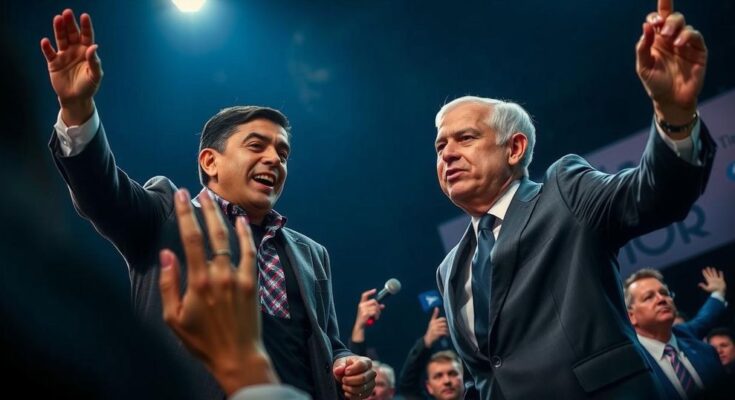Uruguay is set for a presidential runoff, with Álvaro Delgado and Yamandú Orsi in a tight contest after no candidate secured a majority in the first round. Orsi’s Broad Front led with 44%, while Delgado’s party received 27%, bolstered by support from other conservative parties. Voter indecision persists amid concerns about crime and economic policy, marking a significant departure from previous elections.
Uruguay is preparing for a crucial second round of presidential voting, reflecting increased competitiveness in what was previously regarded as a mundane electoral contest. The race is now tightly contested between Álvaro Delgado, representing the conservative National Party, and Yamandú Orsi of the left-leaning Broad Front. In the initial round, Orsi garnered 44% of the votes, while Delgado’s party received 27%. Increasing the tension, other conservative parties, particularly the Colorado Party, achieved a collective 20%, enabling Delgado to remain a serious contender despite the Broad Front’s initial lead. Polls suggest a near tie, with a notable portion of the electorate still undecided.
Both candidates are addressing the public’s growing apprehension regarding a spike in violent crime and economic issues, which have yielded substantial voter indecisiveness. Delgado, who holds a veterinary background and is a longstanding political figure, has positioned his campaign as a continuation of the existing administration’s policies. Conversely, Orsi, representing a working-class background, aims to revive leftist ideologies within the nation, proposing pragmatic reforms for economic development and social programs. As Uruguay navigates these critical elections, its established democratic principles remain a vital cornerstone amid unique regional challenges.
The current political landscape in Uruguay presents a noteworthy shift from typical electoral predictability to a fiercely competitive environment. The impending presidential runoff comes as both major parties strive for control after no candidate achieved a majority in the prior round. The governing coalition had previously been led by the Broad Front, which made significant social reforms over their 15 years in governance. However, recent electoral dynamics, including an economic climate that sees growth yet public concern over crime, have complicated traditional voting patterns. This election, while reflecting common themes known in regional politics, illustrates a strong democratic foundation without overt anti-establishment sentiments that characterize other nations.
In conclusion, Uruguay’s presidential runoff signifies a pivotal moment where traditional political alignments are being challenged. As the race narrows between Álvaro Delgado and Yamandú Orsi, the focus shifts to their respective proposals addressing crime and economic stability. The outcome will not only determine the leadership but also reflect the electorate’s desire for continuity or change in a politically nuanced environment, demonstrating Uruguay’s robust democratic framework amid external pressures.
Original Source: abcnews.go.com




